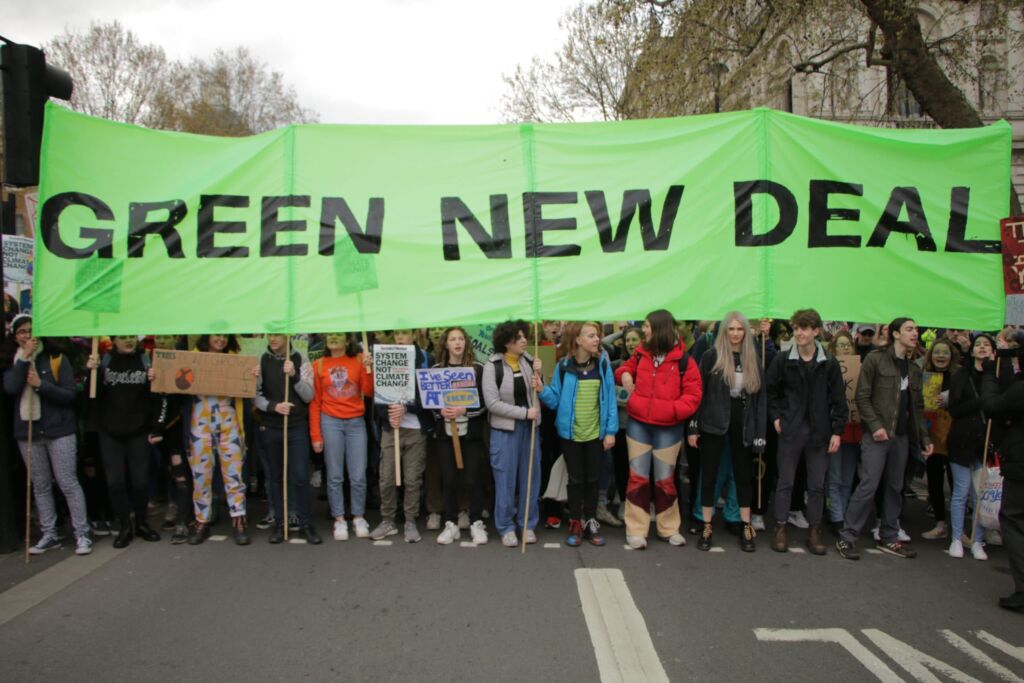The idea of a Green New Deal—a radical and comprehensive transformation of the economy to cut greenhouse gas emissions while tackling inequality—has been gaining steam over the past few decades as an organizing principle for the environmental and social justice movements, but it wasn’t until 2019 that the GND exploded into the mainstream.
Democrats in the U.S. Congress brought the idea to widespread public attention when they introduced a Resolution on a Green New Deal in February. Although it failed to become law, the resolution galvanized activists around the world and provided a blueprint for ambitious legislative action.
In Canada, the Pact for a Green New Deal, a large and growing citizens movement, brought together thousands of Canadians at more than 150 town halls across the country to explore a GND for Canada. Recommendations and next steps are expected in 2020.
Most recently, Peter Julian of the federal New Democratic Party introduced a Green New Deal motion in Parliament. It is a concise and transformative legislative framework for a sustainable and inclusive Canadian economy. The private member’s bill will be debated this year.
What does a Green New Deal look like? Different advocates have advanced different visions using the term, but the general principles are clear:
- We face a climate crisis that requires rapid, global decarbonization, chiefly through the replacement of fossil fuels by cleaner energy sources;
- We face an inequality crisis that requires massive redistribution of not only income and wealth but also political power away from an entrenched, capitalist elite toward citizens and marginalized communities;
- We remain in a state of colonial oppression that requires genuine reconciliation with Indigenous peoples grounded in the sovereignty of Indigenous nations; and,
- We require a hopeful, inspirational vision for the future that includes good jobs, vibrant communities and widespread social and economic wellbeing.
Furthermore, how will we pay for it all? Although inaction will be more expensive in the long term, the price tag of any Green New Deal in the short term is in the trillions of dollars for Canada alone. Even with unprecedented public spending, governments do not currently have the capacity to fund this transition in full, which means private capital needs to be incentivized or coerced into action.
To be clear, these aren’t impossible questions or excuses for inaction. GND advocates have laid out a number of workable answers, including many featured in the CCPA’s Alternative Federal Budget. For example, cracking down on tax havens, tax loopholes and fossil fuel subsidies alone could fund a transformative social and environmental agenda in Canada. Public banks, increased carbon taxation, green bonds and steeper deficit financing are other options for accelerating the transition.
But every policy has trade-offs, and we have yet to see the movement for a Green New Deal tackle those compromises head on. It is crucial that advocates work through the pragmatic realities of a social and economic transformation on this scale, from the disruptions to workers to the logistics for suburban commuters to the concentration of wealth in the hands of clean energy investors.
Providing a transformative vision for the future that both acknowledges and challenges current political and economic conditions is especially important as the political salience of the Green New Deal grows. As the climate crisis deepens and the demand for alternatives swells, we can only expect the GND to attract more and more serious attention in the coming years. Advocates need a clear and practical agenda to make the most of this opportunity.
These criticisms aside, the Green New Deal is one of the most promising alternatives we have for our country and for our planet. If the 2010s were the decade where we finally took the crises of climate change and inequality seriously, the 2020s will—hopefully—be the decade where we get serious about the solutions.
If and when we do, it is in all of our best interests to help make the Green New Deal a reality.
Hadrian Mertins-Kirkwood is a senior researcher on international trade and climate policy for the Canadian Centre for Policy Alternatives. Follow Hadrian on Twitter: @hadrianmk.







